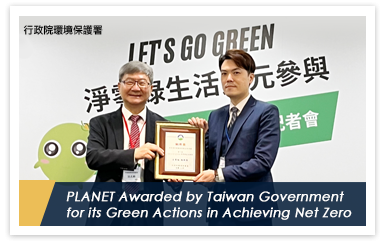PLANET Awarded by Taiwan Government for its Green Actions in Achieving Net Zero

The “Let’s Go Green Competition” organized by Taiwan Environmental Protection Administration (EPA) has awarded PLANET Technology for its continuous effort toward sustainable development practices to achieve net zero emissions.
Taiwan EPA held its first-ever “Let’s Go Green Competition” with the goal to put environmental actions into practice through five categories including: “Green Diet”, “Green Tourism”, “Green Commerce”, “Green Housing” and “Green Office”. This aims to raise awareness about sustainable practices in our daily lives.
PLANET has been a long-time advocate of raising climate change awareness. The “PLANET 2050 Net Zero Carbon Emissions Roadmap” have been implemented to help reduce carbon emissions in all aspects from corporate operations, R&D, office environment to employee welfare, thus promoting and implementing sustainable actions.
PLANET has established the “Principles of Green Product Development” which are strictly compliant with the international environmental requirements including R&D, product design, sourcing, production, transportation, recycling and reuse. Being the world’s first to develop the “Renewable Energy Network Management Solution”, it utilizes renewable energy to power network supply which can reduce approximately 3,516 tons of carbon dioxide in a 10-year period, equivalent to the carbon reduction of nearly 300,000 trees.
PLANET has also established a sustainable supply chain that integrated RBA (Responsible Business Alliance) code of conduct and responsible mineral procurement policy, and has set up “green supply chain management system” to ensure that all our products are manufactured with the least impact on our environment. In the aspect of promoting PLANET brand and products worldwide, it has also shifted toward carbon reduction and environmentally sustainable practices by using digital online platforms including webinars, virtual exhibitions, social media, online meeting platforms, digital catalogs, etc.
To continue the same path toward achieving net zero emissions into 2050, PLANET has participated in a number of international environmental initiatives that are in line with international standards to further bring sustainability influence. These include:
- Being part of the Carbon Disclosure Project
- Sustainable actions which are in accordance with the SASB (Sustainability Accounting Standards Board) standards include assessing the risks and opportunities of enterprises facing climate change in the future and formulating sustainable development strategies.
- Responding to RE100 (Global corporate renewable energy initiative), renewable electricity has been used in PLANET’s office since 2022 in an effort to alleviate climate crisis.
- Joined the "4 per 1000" Initiative to encourage stakeholders to transition towards a regenerative, productive, highly-resilient agriculture, based on appropriate land and soil management.
- Received ISO 14064-1 certification through third-party verification. Report greenhouse gas (GHG) inventory to comprehensively identify and reduce the impact of GHG.
- Became a Task Force on Climate-related Financial Disclosures (TCFD) supporter to actively respond to climate issues and transparent disclosure on climate risks and opportunities.
- Through the third-party verification of the TCFD report, PLANET is committed to reporting on climate risks and opportunities while mitigating the impact on financial planning.
Besides implementing sustainable business operations, PLANET also promotes sustainable practices for employees. To further implement carbon reduction, employees are urged to have a vegan diet once a week. A number of energy-saving measures and the purchase of daily essentials that come with environmental protection labels have further increased employees’ sustainable awareness.
PLANET has adopted the Pinglin organic tea plantation for 13 consecutive years, encouraging farmers to utilize organic planting methods to avoid contaminating the water in the Feitsui Reservoir. Since 2021, the “Clean Air for Health” program has promoted the use of decomposed bacteria to replace rice stubble burning as a sustainable fertilizing method in order to reduce air pollution and carbon emissions. In 2022, PLANET called upon 77 companies to participate in the program, helping to reduce carbon emissions by about 36,900 metric tons, creating a sustainable environment and exerting substantial influence.


